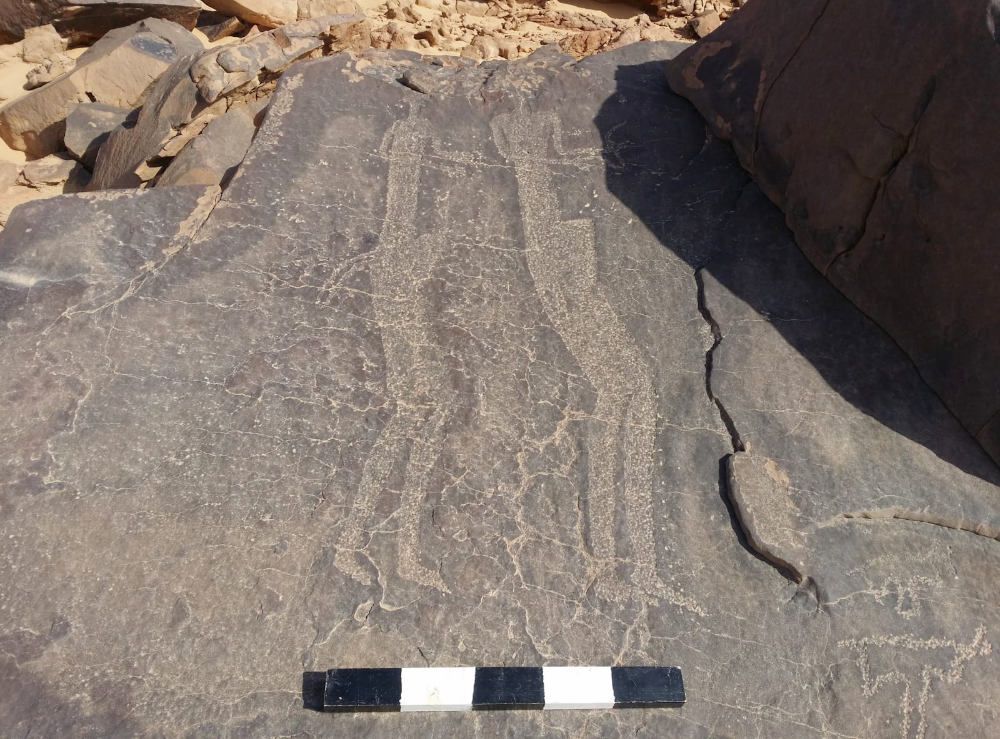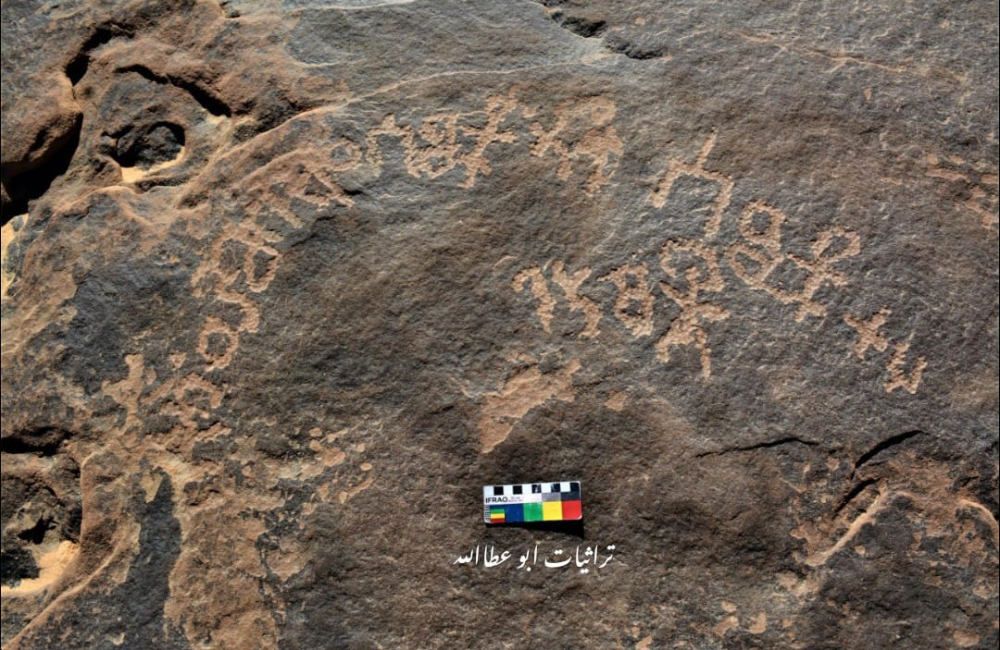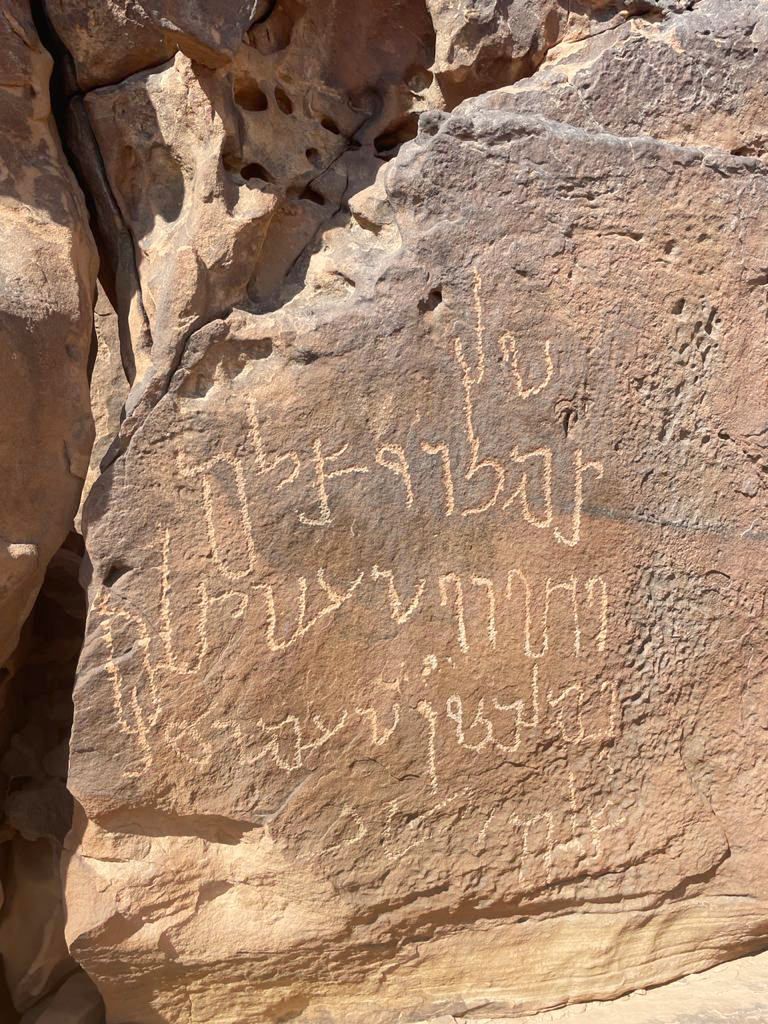Researcher helps discover Saudi archaeological sites, petroglyphs
His interest in research began more than 20 years ago, and his fieldwork has unearthed Aramaic, Dadaani, Nabataean, and Thamudian inscriptions, and prehistoric drawings depicting the daily activities of Stone Age people.
“As a researcher interested in antiquities, I provided the National Museum with more than 24 antiquities, including Aramaic, Lehayani and Thamudian,” he told Arab News. “I also guided authorities to archaeological sites, the most important of which are cumulative burial sites west of Taima, circular burial sites south of Taima, as well as stone installations near Taima Great Wall.”
He was featured in Prince Sultan bin Salman’s book “Friends of Antiquities” as someone who was interested in antiquities and inscriptions. “The pieces I handed over were chosen from among the masterpieces of the Kingdom’s antiquities that were presented to some countries of the world,” he added.
Al-Fahiqi said that old scripts, such as Musnadian, Thamudian, Safaitic, Lihyanite, Dadaani, Aramaic and Nabataean, were not far from the Arabic language, especially the ancient Arabic dialects known as defunct Arabic or the Arabic of inscriptions.

“The dialects are divided into southern and northern. The area of ancient Arab tribes extending from Damascus to AlUla is full of inscriptions. Reading and translating the symbols, writings and inscriptions of the rocks show that the northern Arabic alphabet consisted of 28 letters and, according to scientific and historical studies and archaeological surveys, it is a classical Arabic language.
“The ancient southern Arabic dialects that spread in the south of the Arabian Peninsula consisted of 29 letters, which focused on geometric consistency in writing.”
As for the Nabataean script, from which the Hejazi Arabic script was derived, Al-Fahiqi said it consisted of 22 consonant characters. Although it was a script used by the northern Arab tribes, it belonged to a family of other scripts as it came from the Aramaic line, whose alphabet also consisted of 22 consonant characters.
It was used by the Aramaic tribes that inhabited the far north of Arabia, and they were the ones who derived the Aramaic script from the Phoenician script and developed it.

He said that Saudi universities taught ancient languages in the peninsula, especially in tourism and archaeology colleges, and in scientific centers abroad such as the Islamic University of Minnesota, and in European universities in Germany, Britain, France, Spain, Portugal, Italy and Russia.
He said that Orientalists began arriving in the Arabian Peninsula about 200 years ago to explore its history and study its legacies.
Those interested in the Thamudian inscriptions included the German linguist Emil Rieder in 1837, followed by his compatriot Wilhelm Philippe Schimper in 1841, then the Frenchman Charles Huber, who arrived in northern Saudi Arabia and collected about 130 Thamudian inscriptions from Taima, Jebel Hasma, and Madaen Saleh.
In 1882, he collected Thamudian inscriptions from the region of Hail. Huber made a third trip to Taima, Tabuk, AlUla and Al-Jawf and collected about 825 inscriptions.
He was followed by the German researcher Julius Euting, who collected about 800 Thamudian inscriptions.
The English traveler Charles Doughty, who made expeditions in 1875 and 1877 to the north of the Arabian Peninsula, was followed by a number of Orientalists such as John Philby, Lankester Harding, and others.
Between them they collected many Thamudian, Musnadian, Nabataean and other inscriptions.

Al-Fahiqi said the inscriptions were a historical asset because they talked about the history of the Kingdom and its deeply rooted civilizations.
Saudi Arabia was, he explained, an open-air museum that included thousands of ancient inscriptions from different eras, as shown by archaeological discoveries such as those related to the beginning of horse domestication and the oldest human bone in history, as well as ancient trade routes.
They revealed information about the social, economic, political and religious conditions in the Arabian Peninsula, and provided many insights into names, families, tribes and kingdoms.
They also revealed linguistic and biblical content, serving as an important historical source for the pre-Islamic ages.
Rock inscriptions reveal different types of ancient scripts, including Thamudian, Safaitic, Sabi, Lihyanite, Dadaani, Nabatean, Aramaic, Greek and early Islamic inscriptions.
They are generally spread over a large area of the Kingdom’s territory to the north and south.
Nabatean inscriptions are concentrated in the area of AlUla, Al-Hijr, Tabuk and Taima.
Thamudian inscriptions are mainly concentrated in Hail, Al-Jawf, Qassim, the Northern Borders, and the area of Tabuk around Taima governorate.
The inscriptions of the Sabi and Minaean scripts are spread in the south of the Kingdom in Najran, around the area of Hima, Al-Ukhdud, Tuwaiq and the Al- Kawkab Mountains, Al-Faw, the capital of the first Kindah kingdom in Wadi Al-Dawasir, and the region of AlUla around the site of Al-Khriba.
















